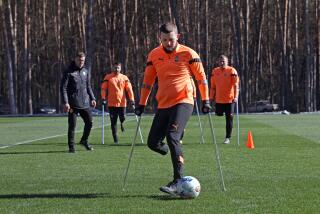Soccer Hero an Inspiration
GLENDALE â Levon Ishtoyan never considered himself to be anything more than a professional athlete.
But fellow Armenian immigrants remember him as the man who led the Armenian national soccer team to an improbable victory over the powerful Russian team and, in the process, helped galvanize a nation under Soviet occupation, stirring feelings of independence that later became a reality.
Ishtoyan, 49, said he finds it hard to believe that his athletic triumphs of 24 years ago were the first kicks of a nascent Armenian independence movement or that his game-winning goal in the 1973 Soviet Union Cup had anything to do with Armenian Independence Day celebrated by millions around the world on Tuesday.
âI just played soccer,â he said.
Other Armenians describe Ishtoyan less as a soccer hero and more as a national hero, however.
âYou give his name to any Armenian--even a lot of Russians--and theyâll know him,â said Aram Alajajian, a Glendale architect who arrived in the U.S. from Armenia in 1979.
âHe made Armenians proud of their nation, even when they didnât have one,â he said. âIt meant a lot to a small nation of people to become champions.â
Ishtoyanâs right leg twitched excitedly as he spoke about his plans to return to Armenia this week, for a nearly monthlong reunion with his former championship soccer team. His eyes lit up when he recalled the team, Ararat. He delighted in recounting their games, the stadiums they played in, and of course, his two big goals.
It was Ishtoyanâs right leg that many Armenians claim struck one of the first blows for Armenian independence, and his left leg the second. His first goal tied the Soviet Union Cup championship game with less than a minute to play; his left leg flicked in the game winner in overtime.
With that second goal, little-known Armenia had a championship team for the first time.
Ishtoyan was the hero for a nation, which, it seemed to him, arrived en masse at the Yerevan Airport to cheer the triumphant Ararat team upon its return to the Armenian capital.
âHundreds of thousands were there,â Alajajian said, counting himself among the masses that greeted Ishtoyan and his teammates on the tarmac. âA nation had turned on its televisions to watch. And then a nation celebrated.â
Ishtoyan said he can recall every minute of the game, which was played before a crowd of nearly 100,000 in Moscow and watched by millions more throughout Europe.
âI live in those days only, it seems,â he said. âBut I saw it only as a game.â
Ishtoyan spoke through an interpreter, though he managed a few words in English before the formal interview began: âI love this country.â But his English is halting. Assimilation, he said, is not easy.
âOf course I miss soccer, but Iâve got a family to feed,â Ishtoyan said. âThatâs more important.â
Language is not a problem in Glendale, he said, where roughly 55,000 Armenians live, according to Armenian community organizations.
âYou donât need to know English to get along in Glendale,â quipped Jack Iskanian, who left Armenia for California 10 years ago. âBut you should know Levon. Even if a lot of the youngsters donât.â
Ishtoyan now works at his brother-in-lawâs rotary-dye manufacturing plant. His deft touch with a soccer ball is useless at his new job, where grace is less important than efficiency on the assembly line. But he is happy here nonetheless, he said, noting that soccer memories help sustain him.
âIshtoyanâs goals lifted Armenia,â said Chahe Keuroghelian, spokesman for the Glendale Police Department, who left Armenia more than a decade ago.
âWe remember his goals well,â Keuroghelian said. âThey made us proud.â
Armenian International Magazine, in a recent article, likened Ishtoyanâs victorious goals to the âeuphoria of independence.â
âIâm just happy to have done my part to put Armenia on the map,â Ishtoyan said. âWe werenât politically minded. We wanted to be soccer players, to play at the highest level.â
But soccer was more than a game to the occupied Armenian nation living under the fist of Moscow, said Larry Zarian, mayor of Glendale.
âSoccer, to Armenians, is the national sport. In the Soviet days, for Ararat to beat the Soviets was the biggest prize for us,â he said. âIt showed that in spite of being under Soviet rule, we could be independent.â
The 1973 game, though widely recalled by those who lived in Armenia at the time, is largely unknown to those Armenians already part of the Armenian diaspora, which spread ethnic Armenians looking for a better life throughout Europe and the United States before the nation won its independence in 1988.
âDuring the Soviet era, the diaspora Armenians didnât follow events within Armenia that closely. We were assimilating. But it was absolutely big in Armenia, that game,â said Vicken Papazian, the American-born director of the Armenian National Committee.
âThe kids donât know anything about it,â he said. âThe youngsters donât know much of the history.â
Ishtoyan has pictures and clippings from his glory days, he said, in case anyone gets curious. âBut it is only soccer to me. I have a full life here now.â
Ishtoyanâs wife and two daughters are happily settled and have no plans to return permanently to Armenia, he said, proudly noting that his older daughter is a scholarship medical student at USC and that his younger daughter is a âfineâ student at Hoover High School in Glendale.
âIndependence Day is a great holiday,â he said. âBut I had nothing to do with it. I just played soccer. Now I try to provide for my family.â
More to Read
Sign up for Essential California
The most important California stories and recommendations in your inbox every morning.
You may occasionally receive promotional content from the Los Angeles Times.










